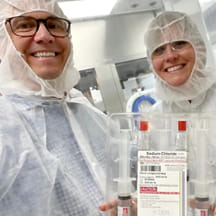Specialty pharmacy is one of the fastest growing markets in health care, with an expected 8% growth annually. For many health systems, determining if a specialty pharmacy is a good fit can be difficult due to large barriers to entry, including capital, accreditation, and distribution logistics, to name a few. Yet, in Akron Children’s experience, the benefits for the health system and patients far outweigh the barriers. Here are five benefits of an internal specialty pharmacy.
1. Reduces fragmented care
Patients who leave the health system to find specialty pharmacy services often are victims of fragmented care. External pharmacies can share limited clinical information with the provider about the patient’s response to treatment, side effects, or counseling points. External pharmacists cannot see the patient’s chart notes to learn the goals of therapy, barriers to care, social determinants of health, and other information that could influence treatment.
For health systems, an internal specialty pharmacy provides a wealth of additional knowledge to care teams, which can improve the patient’s therapy plan. Specialty pharmacists reach out to patients monthly to review their specific disease state goals, counsel on common side effects, monitor therapies, and more. Each of these opportunities is documented in the patient’s electronic medical record. As providers follow up with patients, the monthly interactions with the health system specialty pharmacy equip them with additional details on the patient’s progress and struggles to help them make more informed decisions to guide the patient’s care.
2. Provides more timely care
Patients using national specialty pharmacies often experience long wait times to initiate care, gain access to their medication, or even refill a medication. Therapies needed to treat these diseases often require specific storage and handling requirements, as well as additional patient education, making access and distribution problematic. In addition to complex distribution logistics, external specialty pharmcies often require prior authorization, which can delay access and care for weeks.
Internal health system pharmacies can often reduce patients’ wait time by half, resulting in shorter therapy delays and better clinical outcomes for patients. While some of the delays seen with external pharmacies are due to lack of integration with the health system, others are due to internal processes, lack of follow-up, or internally fragmented services. Health system pharmacies are better suited to provide these services in a timely manner.
3. Expands clinical opportunities
Internal specialty pharmacy practice mixes a traditional dispensing pharmacy model with a clinical care model. This has allowed Akron Children’s to develop a strong clinical ambulatory pharmacy program, implement collaborative practice agreements enabling pharmacists to practice alongside providers at the top of their license, expand a meds-to-beds program, and plan to further expand ambulatory infusion services through the ambulatory program. For Akron Children’s, this has been one of the most exciting opportunities that has come from creating a specialty pharmacy two years ago.
4. Increases provider satisfaction
Integrated specialty pharmacy services enable health systems to remove much of the administrative burden from providers when prescribing these medications. Before implementing a specialty pharmacy at Akron Children’s, each provider team was responsible for submitting prior authorizations, implementing follow-up, making appeals, and engaging in peer-to-peer and patient outreach. This practice model led to widely varied processes, results, and timelines, as well as decreased patient satisfaction due to long wait times or decreased access to therapies.
With an integrated specialty pharmacy, these administrative tasks are reassigned to the specialty pharmacy team, who have the clinical knowledge to complete these tasks efficiently. As work was centralized, turnaround times and prior authorization denial rates decreased across specialty clinics. Decreases in administrative work improved provider team satisfaction and allowed for additional time to focus on patient care.
5. Improves clinical outcomes
Data suggests patients enrolled at integrated specialty pharmacies have better medication adherence, among other benefits, and show improved clinical outcomes and quality of life. Patients at Akron Children’s have experienced this firsthand. Since opening their specialty pharmacy in 2021, Akron Children’s has enrolled 500 patients across more than a dozen disease states. Many of these patients used an external specialty pharmacy previously. Data gathered between 2021 and 2023 shows patients who utilize the hospital’s specialty pharmacy services experience an improvement in clinical outcomes, including a decrease in inflammatory bowel disease progression and improvements in disease progression among cystic fibrosis patients.
Integrated pediatric specialty pharmacies in particular provide a unique opportunity to impact clinical outcomes for the most vulnerable patients. Pediatric specialty pharmacies employ pediatric-trained clinicians, who are skilled in understanding the needs of the patient population and equipping families with the knowledge and expertise necessary to provide care for their children.




